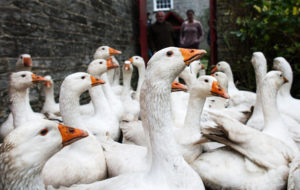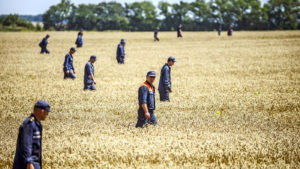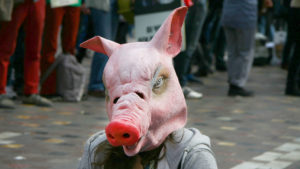For 30 accumulated years, the River Wye flowed alongside my life. I cannot quite say I grew up on its banks, but from the gates of my first childhood home I could throw a stone, across a road and an orchard, into its waters. This was just south of the city of Hereford, where the Wye becomes fat and slow among green meadows and rolling hills; or, put another way, where it achieves a very English bucolic. Later, I farmed for a decade on an upland tributary in the lee of the Brecon Beacons.
So reading the spate of reports regarding its imminent death is like receiving bad news about a friend. It is not even a gentle demise: the Wye is being murdered. It is the totemic case of our national pollution problem as two newspapers launch campaigns to clean up rivers. Fair enough. I learned to swim in the Wye, and fished it for silver minnows; now I would not go into its waters wearing chest-waders. In 2010, the Wye was voted the nation’s favourite river — and celebrated with adjectives including “magical”, “timeless” and “unspoilt”’. In 2020, a thick algal bloom caused by pollution extended along more than 140 of the river’s 155 miles, blocking out sunlight and killing much life below the surface. Now, the Wye’s local cognomen is “shit creek”.
But such was the river’s beauty that following the publication of the Reverend William Gilpin’s Observations on the River Wye in 1782, the British tourist industry was born. The long watery southing miles enthused Wordsworth (“Lines Composed A Few Miles Above Tintern Abbey”) and prompted JMW Turner to get his brushes out several times. It was renowned across the globe for its Atlantic salmon. Kings and prime ministers have fished from its banks of appropriately salmon-pink sandstone. Once, rod catches exceeded 7,000 a year, with the record fish being a 59lb 8oz leviathan — landed by Doreen Davey at Winforton on March 13, 1923. In 2021, only 326 salmon were caught from the Wye, the smallest number since records began.
That was the year the spotlight on the Wye’s parlous ecological state was switched on with Rivercide, a documentary by George Monbiot, which was complemented by his Guardian article, “Britain’s rivers are suffocating to death”. Plaudits to Monbiot for bringing the death of the Wye to public attention. But his forensic environmental investigation immediately hits the banks.
Monbiot’s argument, which now dominates the “Why oh Wye” discourse, flows roughly thus: the 20 million chickens intensively farmed in the Wye’s catchment area produce more than 2,500 tonnes of excrement a year, and this mountain of manure is “the most intense and extreme cause” of the Wye’s pollution. It’s the phosphates in the manure. When it is spread on fields, they leach and leak into the river, and promote algal bloom.
Monbiot is not totally wrong. Indisputably, the phosphates in the run-off from intensive poultry units (IPUs in the jargon) are harming the Wye. The Ithon, one of its tributaries in mid-Wales, contains phosphate levels up to 10 times higher than what you’d expect in a healthy upland river, according to an analysis commissioned by Fish Legal, a non-profit organisation of lawyers who fight water polluters. However, when it comes to the question of who is killing the Wye, simply pointing the finger at poultry farmers lets other culprits off the hook. The gallery of rivercide rogues stretches from the Wye’s source on the bleak slopes of Plynlimon to the Severn estuary.
Humans have been killing the Wye for centuries. If you wished to really get to the bottom of whodunnit, you’d begin with the Romans, who introduced the watermill to these isles. Watermills produce pollution — for instance, if used for fulling, the making of woollen cloth — and hamper the spawning of key fish species, including the Wye’s renowned Salmo salar. Salmon in the Wye, and other rivers in the Palaeo-Rhine basin, may have been reduced by as much as 90% between 450AD and 1600AD.
Then there was overfishing in the 19th century, with 100,000 salmon traps in the Severn and net after net up the Wye to Hay; in 1906, the rod catch of salmon was about 500 fish. Fast forward to the 20th century and acid rain from heavy industry in South Wales was severely impacting the Wye’s headwaters, the quiet brooks where the salmon spawn. Indeed, had The Wye and Usk Foundation not started liming the waters to restore the pH balance in 2003, Wye salmon might well be extinct. The ecosystem of the river has yet to recover from past acid rain.
And there’s the human crap. This year, the Wye has achieved the dubious distinction of appearing at number 14 in the Top of the Poops chart, which ranks England and Wales’s most sewage-polluted rivers. An ITV News analysis of data from Dŵr Cymru Welsh Water, the water company responsible for the areas through which the Wye flows, revealed that in 2020 alone, raw sewage entered the river system for 17.4 million minutes — that’s the equivalent of 33 years. Endlessly blaming the death of the Wye on chicken shit is chicken shit. Environment Agency modelling suggests that raw sewage is the source of 28% of the Wye’s pollution, which is no small matter.
Sewage is also known to cause algal bloom: in 2021, the United Utilities Staveley sewage works, near Windermere, spilled untreated sewage into a nearby stream 80 times for a total of 1,172 hours. The result was a literally sick-making algal bloom on Lake Windermere. But sewage isn’t only to blame. If we are to save the Wye, we may also need to look to the Heavens. Climate change is expected to make algal blooms more common.
So how guilty is the notorious chicken excrement? So extreme is the phosphate runoff from poultry farming that George Monbiot requires us to give up eating chicken to save the Wye. “We do not NEED chicken”, he says, adding: “It’s time conservationists became bolder and spoke out against the world’s greatest cause of ecological destruction: animal farming.” But let’s pluck the Wye’s chicken problem a little. The expansion of IPUs in the Wye’s catchment area over the past five years is clearly a driver in phosphate pollution, but the phosphate overload in local soil is a legacy issue, dating back decades.
The most authoritative analysis, “Re-focusing Phosphorus use in the Wye Catchment”, attributes 60-70% of said mineral pollution to agriculture, but is careful to enumerate the various culpable parts of agriculture, not just the IPUs. The major culprits include potato-growing, which, last time I checked, was a vegan-approved crop. Phosphate is an ingredient in the artificial fertilisers widely used in large-scale potato-farming, and excess runs off the fields along with the soil when it rains. It all goes into the river. With not a chicken in sight.
Monbiot’s anti-poultry agenda is a diversion, not an answer. You absolutely can have your chicken and your Wye. Small-scale poultry production, with organic free-range hens scratching around apple orchards, naturally manuring the earth: there is no evidence whatsoever that this model is anything but beneficial to the environment. Having your intensively-farmed, £3.50 chicken from Tesco and having your Wye is another matter. It’s not the chicken, it’s how you farm them.
The greatest environmental problem for the Wye is not the warming of the planet, acid rain, or excrement, whether human or avian: it is chemically-addicted conventional farming. The phosphates in chicken manure leach into the upper Wye for the same reason that phosphates from artificial fertiliser on potato fields enter the river downstream near Ross: the parlous state of the soil, caused by overuse of pesticides, herbicides, molluscicides, fungicides and compaction from machinery. Some potato-growing farmers I knew — whose liking for herbicides and pesticides always made me think of them as “The Chemical Brothers” — lost tons of topsoil per annum from a single 40-acre field. Into the brook, which ran brown, which joined the Wye, which ran brown. There are fields in Britain losing 47 tons of soil per acre per annum. As Natural England notes, “soil and nutrients washing off agricultural land is the most common reason for our rivers and streams becoming unhealthy”. Good, healthy soil, by contrast, can hold huge amounts of water, and is not saturated with phosphates — or indeed that other chemical killer of fresh water, nitrates — because it has been “husbanded”. That is, farmed properly.
Call me cynical, call me biased, but doesn’t the “It’s all the fault of poultry farmers” argument stink a bit of a vegan agenda? In an age when whole cities are trying to erase meat from school menus, it’s fashionable and easy to blame the livestock farmer, and answer every complex environmental problem with: “Go plant-based!”
But you could close all the IPUs in the Wye catchment area and turn them over to cabbage production for vegans, and you would still have phosphates streaming into the river. It will continue to die unless the area’s agriculture, be it livestock or crop, adopts en masse soil-aware, sustainable and nature-friendly principles. What’s more, you could say the same about almost every river in the country. Meanwhile, quiet flows the Wye towards its grave.
Disclaimer
Some of the posts we share are controversial and we do not necessarily agree with them in the whole extend. Sometimes we agree with the content or part of it but we do not agree with the narration or language. Nevertheless we find them somehow interesting, valuable and/or informative or we share them, because we strongly believe in freedom of speech, free press and journalism. We strongly encourage you to have a critical approach to all the content, do your own research and analysis to build your own opinion.
We would be glad to have your feedback.
Source: UnHerd Read the original article here: https://unherd.com/





